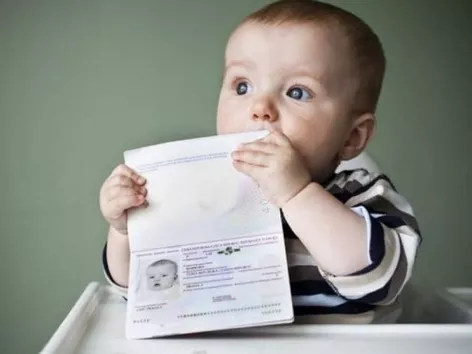In which countries a child can obtain citizenship by birthright: the current list

New-born children can receive citizenship at the place of birth. Learn more about the peculiarities of obtaining citizenship based on the birth of a child
Newborn children can inherit citizenship from their parents by blood (jus sanguinis) or acquire it by birth (jus soli). In the latter case, the state immediately grants citizenship to all newborns, regardless of the nationality of the parents, although in some cases a number of additional conditions are required.
The principle of granting citizenship at birth (jus soli) is applied to varying degrees in more than 60 countries around the world. We explain the peculiarities of acquiring citizenship by birth in different regions.
💡 Do you want to understand the issue of citizenship by birth in more detail?
Lawyers specialising in migration issues will help you here. You can find such professionals on the Visit Ukraine portal. Our experts will help you to understand the complex issue of citizenship by birthright and will tell you where the relevant rules are applied more easily and where there are pitfalls.
European countries
In most European countries, the birth of a child on the territory of a state does not in itself guarantee citizenship. As a rule, laws combine the jus sanguinis principle with jus soli requirements: in addition to the fact of birth in the country, parents are often required to have legal residence (residence permit or other permit status).
United Kingdom
A child born in the country acquires citizenship immediately if at least one of the parents had a residence permit (permanent residence or citizenship) at the time of birth. Additionally, persons born in the UK and who have lived in the country for the first 10 years can apply for citizenship registration even if their parents are not citizens or permanent residents.
Greece
Children acquire citizenship if their parents have legally resided in the country for at least 5 years prior to birth. If the child was born abroad, but the parental residency requirement is met, he or she can acquire citizenship after completing a 6-year course at a Greek school.
Ireland
In order to obtain citizenship, a child must be born in Ireland and both parents must have legally resided in the country for at least 4 years prior to birth.
France
In France, the rules for obtaining citizenship for children are rather complicated: a child born in France can acquire citizenship upon reaching the age of 13, provided that he or she has lived in France for most of his or her life. At the same time, parents do not have to be permanent residents.
Portugal
In Portugal, a child born on its territory can apply for citizenship if at least one of the parents has legally resided in the country for at least 1 year before birth. This measure is aimed at attracting foreign specialists and investors.
North America
USA
According to the principle of jus soli, all children born in the United States automatically acquire citizenship on the basis of a certificate from the maternity hospital, and later - a birth certificate and a passport. (It should be noted that despite the periodically discussed proposals to restrict this right, the 14th Amendment currently remains the basis for automatic citizenship). Also, when a child turns 21, he or she will be able to apply for family reunification for the purpose of obtaining citizenship for the parents.
Canada
In Canada, birthright citizenship is granted to all children born on its territory, regardless of the citizenship of the parents. A birth certificate and an application are sufficient to obtain a passport. However, the child's mother must be legally present in the country.
Don't want to miss important updates and useful articles? Subscribe to our weekly newsletter!
Central, South America and the Caribbean
Mexico
All children born in Mexico acquire citizenship by birth. In addition, parents can also obtain Mexican citizenship by birth if they reside in the country for at least 2 years and pass an exam in Spanish and Mexican history.
Countries of South America
Almost all countries of the continent grant citizenship to newborns at birth without additional conditions. The only exception is Colombia, where at least one of the parents must have a residence permit. In Peru, birthright citizenship is granted to a child upon reaching the age of 18.
The Caribbean
In most Caribbean countries (e.g. Antigua and Barbuda, Barbados, Dominica, Saint Kitts and Nevis, Saint Lucia, Saint Vincent and the Grenadines), newborns are automatically citizens.
Citizenship of these countries has a number of advantages: visa-free travel to the Schengen area and the UK, the possibility of obtaining a tourist visa to the US for 10 years, and benefits when applying to British universities.
Asian countries
In Asia, the practice of granting birthright citizenship is much less common than in the United States and is often associated with additional conditions.
Pakistan
In Pakistan, birthright citizenship is granted automatically to all children born in the country, except in cases where the child is born to diplomats.
Thailand
In Thailand, a child can acquire citizenship if his or her parents have legally resided in the country for at least 5 years before his or her birth.
Israel
A child born in Israel who has not obtained any other citizenship can apply for Israeli citizenship between the ages of 18 and 21. At the same time, a passport is issued to those who have lived in Israel for at least 5 years before applying.
Africa
In some African countries, citizenship by birth is granted automatically, while in others, additional requirements are met.
Lesotho and Tanzania
Children born in Lesotho and Tanzania are automatically granted citizenship.
Tunisia
A child can obtain Tunisian citizenship if his or her grandfather was born in Tunisia. This measure allows you to maintain a connection with national history and culture.
Australia and Oceania
Australia
In Australia, birthright citizenship is granted to children who were born and lived in the country for the first 10 years. However, if the parents do not have permanent residence, citizenship may require additional procedures.
Tuvalu and Fiji
In Tuvalu and Fiji, all newborn children automatically become citizens of the country. These countries are popular due to relatively simple conditions for obtaining citizenship and few administrative barriers.
New Zealand
Unlike the United States or Canada, New Zealand does not grant automatic birthright citizenship to children of foreign nationals. Citizenship is acquired on the basis of jus sanguinis, which means that a child acquires citizenship if at least one of the parents is a citizen or permanent resident of New Zealand.
Contact migration lawyers on Visit Ukraine for help and make your citizenship application as easy as possible.
We remind you! The issue of dual citizenship for children is becoming increasingly relevant due to global migration and martial law in Ukraine. We talked about the legal nuances, registration procedures and peculiarities of the legislation of different countries on obtaining citizenship by children under 18.
Want to know more? Read the latest news and useful materials about Ukraine and the world in the News section.
Our recommendation for a safe and comfortable trip:
Visit Ukraine Insurance - insurance for a safe stay abroad without unnecessary expenses;
Green Card - compulsory car insurance for traveling abroad;
Visit Ukraine Tickets - book tickets for buses, trains, and airplanes to/from Ukraine and between cities around the world;
Private Lawyer service - professional legal support on visa and migration issues;
Visit Ukraine Merch - buy patriotic clothing and accessories with worldwide delivery.
© 2018-2025, Visit Ukraine. Use, copying or reprinting of materials on this site is permitted only with a link (hyperlink for online publications) to Visit Ukraine.
All rights reserved.
Recommended articles
2 min
Documents
The procedure for confirming a child's citizenship in Ukraine is mandatory for obtaining a Ukrainian passport and other important documents. Find out about the required documents, deadlines, and peculiarities of the procedure for different categories of applicants
22 Oct. 2024
More details3 min
For foreigners in UA
How long do you need to live in Ukraine to obtain citizenship?
Obtaining Ukrainian citizenship is a multi-stage process that requires compliance with certain requirements. There are general rules for most foreigners and stateless persons, but there are simplified conditions for certain categories. Learn more about how long you need to live in Ukraine to obtain citizenship
15 Jan. 2025
More details2 min
For foreigners in UA
Citizenship or residence permit: what rights and obligations does a foreigner have in Ukraine?
Foreigners who plan to move to Ukraine often face a choice: to obtain a residence permit or apply for Ukrainian citizenship. Find out what is the difference between these two statuses, what are the pros and cons of each of them, and how to choose the legalization option for yourself
24 Jan. 2025
More details2 min
VU lawyers explain
Ukrainians who have renounced Ukrainian citizenship but wish to restore it are faced with the question: do they need to renounce the citizenship of another country? This is especially true for those who live in countries that recognize dual citizenship, such as Germany. Let's understand the rules of restoration of Ukrainian citizenship on the example of a real appeal to Visit Ukraine lawyers
28 Jan. 2025
More details

